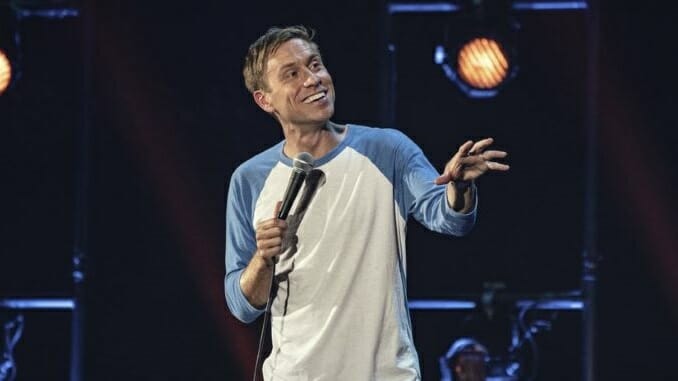Russell Howard Discusses Bill Hicks, Branding and Baths
Photo by Pete Dadds, courtesy of Netflix
Russell Howard may not be plastered all over screens in the US, but he’s a regular fixture on UK television. He’s got The Russell Howard Hour, as well as popping up in the usual places you see British comedians: The Jonathan Ross Show, Taskmaster and The Last Leg, to name a few. In short, Howard is extremely successful and easily consumable.
His career spans over two decades and he’s performed for crowds over 10,000 people strong. I asked Howard over Zoom what compels him to keep writing and performing stand-up, considering his already numerous triumphs and ubiquitous status on British TV.
“There’s a Bill Hicks CD called Arizona Bay, and I kind of feel like every comic is trying to get to their version of Arizona Bay, where that, for me, is him at his best. And it’s that pursuit of the perfect hour, you know, that’s what I love,” he explains.
Later, the Bristol native adds: “I started doing stand-up when I was a kid. I’ve kind of grown up in the world of stand-up as it were. So initially you just want to be funny, and you just want to dazzle people and you’re afraid to lose the audience. And then something happens the further you get into it, where there’s certain things you want to say. And I really like to try and to make points with jokes.”
The latter statement surprised me a bit; many comedians say they want to send a message with their comedy, but Howard’s latest hour for Netflix, Lubricant, hardly has any material that would ruffle feathers, save for a bit about Michael Jackson. Most of his takes feel like something you’ve seen on Twitter already, just enhanced by Howard’s enthusiastic accent work and physical comedy.
Perhaps the most controversial thing Howard has done lately is interview Jordan Peterson on his YouTube channel, which he explained away to me with a bit of bothsidesism: “We interview lots of people, and I quite like interviewing people across the spectrum, rather than kind of who you would necessarily think a sort of a left-leaning comedy show would interview.”
Howard may be left-leaning, but he stops short of committing to any particular credo, for risk of losing the observational vantage point of the outsider.
“I’m full Bob Dylan, do you know what I mean? I just kind of write about it,” he says, later continuing, “I love reading and writing and thinking, but I think as soon as you nail your colors to one ideology, then you cease to be funny.”
Funny is undoubtedly at the root of most everything Howard does. His latest special’s thesis statement is an updated version of “laughter is the best medicine”: laughter is the lubricant for all the shitty things in life.
-

-

-

-

-

-

-

-

-

-

-

-

-

-

-

-

-

-

-

-

-

-

-

-

-

-

-

-

-

-

-

-

-

-

-

-

-

-

-

-








































